One is quick but expensive. The other is economical but slow – and tricky to get just right.
Extractors looking to isolate certain cannabinoids have long relied on chromatography to dial up or down the many cannabinoids in hemp and marijuana plants.
But a technique formerly derided as the mark of inferior product – degradation – is getting new attention.
Cannabis extractors are experimenting with better ways to use light, heat and pressure to hasten the way THC degrades into CBN, a minor cannabinoid gathering interest for its therapeutic potential.
Long considered an unwanted waste product of “stale” cannabis, CBN is created when THC-A is exposed to light or oxidized. Some cannabis product manufacturers say the degraded THC has sleep and anti-inflammation benefits worth exploring.
At Extract Labs in Boulder, Colorado, a team of university engineering students is spending the semester experimenting on degradation techniques. The goal: To speed up THC degradation to create distillate rich in CBD but also in CBN.
“It takes months or years if you let nature take its course,” explained Extract Labs CEO Craig Henderson. “We’re trying to figure out ways to do it in days.”
Savings drive innovations
Hemp extractors are especially interested in degradation methods to remove THC.
Rather than use large quantities of chemical solvent to remove THC that must then be thrown away, degradation offers a path to keep more CBD and terpenes intact and replace THC content with a valuable, nonintoxicating minor cannabinoid.
“It’s definitely more cost-effective to degrade rather than to go through chromatography,” said Alex Goff, COO of Gemini Extraction in Erie, Colorado.
“Chromatography has issues with mass loss and expensive solvent. Degradation does take more time than chromatography, but on a net-cost basis, the savings are significant.”
Deepank Utkhede, COO of Vantage Hemp in Greeley, Colorado, said the price difference makes degradation impossible to ignore.
“With the chromatography, you’re taking (cannabis) and you’re putting it down a chromatography column and you’re using vast amounts of solvent,” Utkhede said
“Then you have to remove that solvent and then do a drying process to remove any residual solvents.
“With the degradation path, you basically just take that material, you mix it and you heat it and you apply a slight vacuum and that’s all you do. There’s no drying step. There’s no solvent-removal step.”
Not for everyone
Despite degradation’s benefits, no one is writing off chromatography extraction.
That’s because chromatography’s speed makes it necessary for large-scale production.
CBN’s legal murkiness is another point in favor of chromatography.
Some countries, such as the United Kingdom, expressly prohibit CBN. The United States has legalized hemp and its byproducts but also maintains that THC — even if it comes from hemp — is a controlled substance, potentially making CBN an illicit “analog” of THC.
As with delta-8 THC, the confusion about CBN’s legal status in the U.S. hasn’t been thoroughly vetted in court. It’s enough for some CBD customers to want even degraded THC removed from the product.
“Chromatography allows us to actually remove the THC, which is beneficial for international markets,” said Arthur Jaffee, CEO of ECS Brands in Boulder, Colorado.
“Particularly in the UK, CBN is classified and categorized and treated the same as THC. So you can’t sell anything with CBN internationally.”
At River Organics in Gloucester, Virginia, domestic customers clamor for THC-free products, too, though the company is still working on organic ways to remove all THC from its extracts, operations manager Ryan Cross said.
“Our goal is to use remediation to be able to provide our customers with products that meet either their personal beliefs around THC, or their job requirements just don’t make it compatible,” Cross said.
Still, the expense of chromatography makes Cross pause.
“The CBD industry is transitioning from chromatography,” he said. “The market for CBD distillate and isolates has gone down dramatically since they became legal. … So cost is really the driving factor in profitability for this industry.”
Customers will decide
Extractors say the end users of cannabis extracts will ultimately determine how common THC degradation or remediation through chromatography is used.
Utkhede said that U.S. and international markets are headed in different directions.
“There are two categories of what people are looking for. There are the people who are interested in the full-spectrum oil and, for North American markets, they’re more interested in being THC-compliant. So basically getting that THC level below the 0.3%. But they also want the entourage effect and some of the terpenes, Utkhede said.
“But if you’re looking for a more global expansion like Europe or Brazil or Latin America, those jurisdictions aren’t looking for compliance, they’re looking for non-detectable THC.”
On the other side are customers looking for ever-higher quantities of expensive minor cannabinoids.
“Our customers want oil with more minor (cannabinoids) in it, say 10% to 20% minors,” Goff said. “And since CBN is so expensive, it’s nice to be able to convert THC into CBN and then spend less money on a CBN isolate.”
Kristen Nichols can be reached at [email protected].



